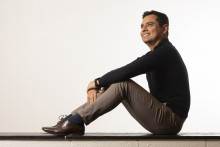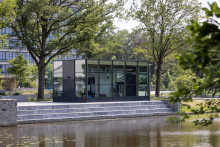It was supposed to be one of the most beautiful and special moments in the lives of the UT scientists. However, during the delivery of their second daughter, things went acutely wrong. UT PhD candidate Sakshi Kannan suffered a cardiac arrest. She died on 11 January at Beth Israel Deaconess Medical Center in Boston, moments before she welcomed her second daughter.
Sakshi Kannan and Kannan Govindaraj had been residing in Boston for some time. Govindaraj is connected to both the UT and Harvard through a Marie Curie fellowship. Sakshi travelled with him, while working on her PhD trajectory at the UT, at the Developmental BioEngineering group of the S&T faculty. The plan was to return to the Netherlands with their children after a year and a half, to finish Kannan's project here and for Sakshi to defend her dissertation.
Her supervisor, associate professor Janine Post, speaks of a 'gut punch' for herself and her colleagues. 'I see all my PhD students as my children.' Post supervised the PhD projects of both Govindaraj and Kannan. Govindaraj obtained his PhD in 2020. Years before, when the couple arrived in Enschede from India in 2014, Sakshi Kannan initially started working as a volunteer at the group. 'After more than a year, we were fortunate to be able to offer her a position as a PhD student,' says Post.
‘Super mom lab shero’
With her death, a much-loved colleague is lost. 'She was incredibly dedicated, warm, and friendly. As a scientist, there was no agreement she didn't keep. She was smart, a strong communicator, and had obvious writing talent,' says Post. 'But above all, as a colleague, she was always there for everyone. My group has always had many first- and second-generation students. No matter how talented and qualified they are, they often face a certain disadvantage. But Sakshi was always there to guide them forward.'
The appreciation for her was reflected at a farewell party before the couple left for Boston. Colleagues gave Kannan a certificate in UT style, granting her the title of 'Super mom lab shero'. Even when she had become a mother during her PhD, she could occasionally even be found at the UT at night. Due to the nature of her research – the influence of the circadian rhythm in cartilage maintenance and osteoarthritis – she had to do measurements every four hours. It was not for nothing that the words on the 'certificate' read: 'Despite the thrill of pulling all-nighters, the anxiety of meeting deadlines, and having given birth, you have managed to keep your sense of humor and your sanity (mostly) intact. May this certificate serve as a reminder of your resilience, determination, and most importantly, your sense of humor, which has kept us all laughing even during the toughest of times'.
Fundraising campaign
Loved ones have started a fundraising campaign for Govindaraj and his daughters. More than 58 thousand dollars have now been raised via Gofundme. As stated on the campaign page, the money is intended for the future of widower and daughters. In practice, the money will most likely have to be spent to cover medical costs, Post explains. 'You have to see it in an American perspective. Not everything will be covered by the insurance. Sakshi had to be rushed to another hospital. And the baby has only now, after almost a week, been released from the neonatal intensive care unit. Given the astronomical healthcare costs in the United States, I expect that the target amount of 100 thousand dollars will hardly be sufficient. We hope that we can at least manage to get Kannan through this situation without debt,’ Post said.
Posthumous promotion
Sakshi Kannan was about to complete her PhD trajectory. 'There was only one manuscript left which involved other PhD students as well. But we were already in the process of drafting a schedule leading up to the defense,' says Post. 'Only the last dots on the i's remained.'
Her colleague, professor Jeroen Leijten, quickly suggested that Kannan should be granted the doctorate posthumously. 'That would have to be formally requested by the family,' says Post, who herself has an outspoken desire to complete Kannan's work. 'I think she would have wanted it herself. What struck me was that she was still working on her research well into her maternity leave. I would like to make it happen for her children. So that in the future, they may know: this is what our mother created.'






